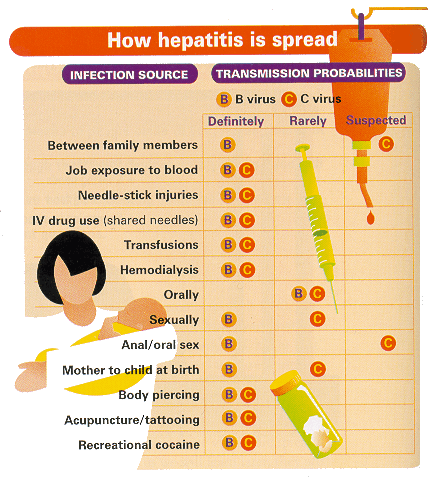What Is Hepatitis?
Hepatitis is an inflammation of the liver. It may be caused by drugs, alcohol use, or certain medical conditions. But in most cases, it's caused by a virus. This is known as viral hepatitis, and the most common forms are hepatitis A, B, and C.
Difference between Hepatitis B & C
 Hepatitis B and C have some similarities to each other, but also a number of important differences. Like any form of hepatitis they both attack the liver, sometimes causing serious liver damage. They can both be transmitted by blood to blood contact with an infected person. They are both treatable with medication, which is improving all the time and this means that those infected with either hepatitis B or C can usually live a long and healthy life with a few lifestyle changes. There are similarities in the some of the ways in which you might become infected, including sharing needles or equipment used to inject drugs (including steroids); through infected blood products; passed on from mother to child and more.
Hepatitis B and C have some similarities to each other, but also a number of important differences. Like any form of hepatitis they both attack the liver, sometimes causing serious liver damage. They can both be transmitted by blood to blood contact with an infected person. They are both treatable with medication, which is improving all the time and this means that those infected with either hepatitis B or C can usually live a long and healthy life with a few lifestyle changes. There are similarities in the some of the ways in which you might become infected, including sharing needles or equipment used to inject drugs (including steroids); through infected blood products; passed on from mother to child and more.
However, there are also a number of important differences between hepatitis B and hepatitis C.
Transmission
 Hepatitis C can only be transmitted through blood to blood contact with an infected person. Only in extremely rare cases can it be passed on through bodily fluids (there have been some reports of men co-infected with HIV passing on hepatitis C during sex). In Scotland the most common means of transmission of hepatitis C is sharing equipment used for injecting drug use.
Hepatitis C can only be transmitted through blood to blood contact with an infected person. Only in extremely rare cases can it be passed on through bodily fluids (there have been some reports of men co-infected with HIV passing on hepatitis C during sex). In Scotland the most common means of transmission of hepatitis C is sharing equipment used for injecting drug use. If you have been infected with hepatitis C and successfully cleared the virus - this does not mean that you are now immune and cannot be re-infected. You can be re-infected with the same strain again, or infected with more than one strain at any given time
If you have been infected with hepatitis C and successfully cleared the virus - this does not mean that you are now immune and cannot be re-infected. You can be re-infected with the same strain again, or infected with more than one strain at any given time Hepatits B can be transmitted through blood to blood contact, but is more commonly transmitted through bodily fluids - particularly during sex. In Scotland the most common means of transmission is mother to child transmission during birth. All pregnant mothers in Scotland are now screened for hepatitis B because if the mother is infected, it is very important that a child receive the hepatitis B vaccine at birth to give the best chance of protecting against a lifelong hepatitis B infection.
Hepatits B can be transmitted through blood to blood contact, but is more commonly transmitted through bodily fluids - particularly during sex. In Scotland the most common means of transmission is mother to child transmission during birth. All pregnant mothers in Scotland are now screened for hepatitis B because if the mother is infected, it is very important that a child receive the hepatitis B vaccine at birth to give the best chance of protecting against a lifelong hepatitis B infection.
If you have previously been infected with hepatitis B and successfully cleared the virus you are now immune and cannot become infected again.
Vaccines and Treatment
There is no vaccine for hepatitis C, but there are now very effective treatments which can cure up to 80% of those infected depending on the strain of the virus they have. Around 20% of those who are infected with hepatitis C clear the infection naturally during the acute phase (first six months) and do not develop a chronic infection requiring treatment.
There is a vaccine for hepatitis B which can prevent you from becoming infected. However, for those who develop a chronic infection - there is no medical cure. You may be able to live a healthy life with the virus not severly damaging your liver, or you may require treatment to keep the virus under control. 95% of those infected with hepatitis B as adults clear the virus naturally. However, 90% of children infected under 12 months of age who do not receive the vaccine will develop a chronic/lifelong infection.




.jpg)
No comments:
Post a Comment